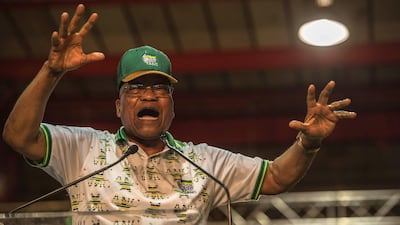The South African rand surged to a six-month peak on Tuesday after the news that Cyril Ramaphosa, the current deputy president, has succeeded Jacob Zuma as the president of the ruling ANC party, reflecting the hope that he will tackle some of the urgent economic issues that are threatening a full-scale economic crisis.
But it may be too early to celebrate: Mr Zuma is still in power, with another 18 months to serve as state president, and can do a lot more damage in that time. Last week the state-controlled arms manufacturer Denel disclosed it didn’t have enough cash to pay its staff over Christmas and Eskom, the monopoly energy supplier, is in even bigger trouble, sinking under the weight of its debt, which is big enough to sink the entire country.
Yet Mr Ramaphosa brings a commodity to South Africa that has become rare under the Zuma regime: hope. He has promised, once he assumes the reins of power, to tackle corruption, stamp out the practice of “state capture” and implement a comprehensive economic plan (which is already official government economic policy but no one in government pays any attention to it) for restoring financial disciplines and re-igniting growth. He is also seen as investor-friendly and, as a rand billionaire himself, will be able to work with a business sector that Mr Zuma had thoroughly alienated and which is essential for turning things around.
But it’s not going to be easy and within hours of his victory on Monday, cooler heads were already warning of the difficulties Mr Ramaphosa faces. Nine years of Mr Zuma’s presidency have done immense damage, not just to the economy, but to the institutions and state corporations, which have been systematically plundered by his cronies and appointees. SARS, the state revenue service, used to be one of the most efficient tax-collecting agencies in the world. But after it challenged Mr Zuma over his private tax affairs, its key staff were moved or sacked, its investigative powers curbed, and a Zuma crony, who knows nothing about tax, was put in charge. The result is a 42 billion rand (Dh12.05bn) hole in the public finances.
____________
Read more:
Traders welcome Ramaphosa's win in South Africa
Country at a crossroads as Zuma's reign nears end
____________
The former finance minister, Pravin Gordhan, a man of rock-ribbed integrity who actually ran SARS and was twice fired by Mr Zuma, warns that in its current state the economy “is not going to grow at more than 1 per cent when what we need is 4 to 5 per cent”. There have been two recessions in the past 10 years, which is difficult to achieve at a time when the world economy has been growing strongly, and in the past three years the country has averaged growth of less than 1 per cent, well below the growth in its population. South Africa, with one of the biggest wealth divisions in the world, has actually been going backwards.
“The current leadership has failed us,” says Mr Gordhan, “because it’s primary occupation has been how to fill certain people’s bank accounts, local and foreign. That’s been their priority - not the 55 million South Africans.” By “certain people”, he means the Indian-born Gupta family who, through their influence over Mr Zuma, have in effect “captured” the state through the appointment of their cronies as ministers in key departments and as heads of the big state-owned companies. Financial investigators, with the help of a huge leak of internal emails provided by a whistleblower, have tracked their influence into the deepest corners of the state machinery. Mr Gordhan calculates they have “stolen” 100bn rand of state money through the award of lucrative state contracts and inflated fees to their own companies.
“Members of the cabinet have associated themselves with people who have proven themselves prime extraditors of revenue and wealth from the tax-payers,” he says. Monday’s vote, therefore, was bad news for the Guptas, who must see their days in South Africa as numbered. Not that they will worry too much - by most estimates they have successfully “laundered” several billion dollars to their interests. Now based in the Middle East, their life will be more comfortable than the potential alternative: jail.
The first test of Mr Ramaphosa’s global standing will come in February when Moody’s Investors Service rates the country’s debt. Right now, it is the only one of the three big agencies that holds rates it at above junk status, and it has been hanging on for the budget before making up its mind. If Mr Ramaphosa had lost the weekend’s vote to his rival, Nkosazana Dlamini Zuma, the president’s former wife, Moody’s might not even have waited that long. Just hours before the voting started, Mr Zuma had caught his own finance minister, Malusi Gigaba, by surprise when he announced free university fees for nearly a million students, a populist move he thought might just tip the balance in her favour. Fortunately, it didn’t work - and couldn’t have been paid for in any case.
The big question now is: will Mr Zuma be able to serve out his term as state president, which ends with the next general election in 2019? Mr Zuma himself removed Thabo Mbeki, the then president, in similar circumstances 10 years ago. Mr Ramaphosa’s supporters are hoping he can do the same thing. In which case the rand might strengthen further.
It has been a good weekend for South Africa.

